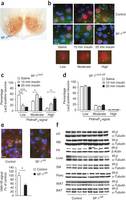研究人员发现,小鼠大脑中胰岛素的活性能将高脂肪饮食转化为肥胖。新成果发表在6月在线出版的《自然—神经科学》期刊上,这将有助于科学家们深入理解高卡路里饮食如何影响大脑中的胰岛素、导致代谢功能和体重的变化、最后出现肥胖症和健康问题。
瘦蛋白和胰岛素是一种循环蛋白,我们每日饮食行为的某些方面如食物摄取和能量消耗等均受循环蛋白水平的变化所控制。Jens Brüning和同事合作,在小鼠体内鉴别出对应于胰岛素并促进肥胖的特定脑细胞。当他们将小鼠大脑中的这些胰岛素受体蛋白质从神经细胞中剔除时,小鼠对增加体重的高脂肪食物表现出抵抗性。

生物探索推荐英文原文摘要:
High-fat feeding promotes obesity via insulin receptor/PI3K-dependent inhibition of SF-1 VMH neurons
Abstract
Steroidogenic factor 1 (SF-1)-expressing neurons of the ventromedial hypothalamus (VMH) control energy homeostasis, but the role of insulin action in these cells remains undefined. We show that insulin activates phosphatidylinositol-3-OH kinase (PI3K) signaling in SF-1 neurons and reduces firing frequency in these cells through activation of KATP channels. These effects were abrogated in mice with insulin receptor deficiency restricted to SF-1 neurons (SF-1ΔIR mice). Whereas body weight and glucose homeostasis remained the same in SF-1ΔIR mice as in controls under a normal chow diet, they were protected from diet-induced leptin resistance, weight gain, adiposity and impaired glucose tolerance. High-fat feeding activated PI3K signaling in SF-1 neurons of control mice, and this response was attenuated in the VMH of SF-1ΔIR mice. Mimicking diet-induced overactivation of PI3K signaling by disruption of the phosphatidylinositol-3,4,5-trisphosphate phosphatase PTEN led to increased body weight and hyperphagia under a normal chow diet. Collectively, our experiments reveal that high-fat diet–induced, insulin-dependent PI3K activation in VMH neurons contributes to obesity development.







